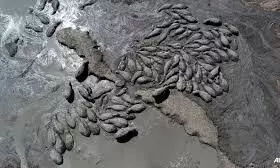
Endangered hippos trapped in dry ponds in drought-hit Botswana
text_fieldsBotswana's conservation authorities have raised concerns about herds of endangered hippos are stuck in dried-up ponds, facing the risk of perishing amid severe drought conditions.
The ongoing drought in Southern Africa, attributed to the El Nino weather phenomenon, has adversely affected harvests and led to widespread hunger, prompting several countries in the region to declare a state of national disaster.
In Botswana, near the expansive wetlands of the Okavango Delta, the Thamalakane River has dried up, compelling hippos to seek refuge in dwindling water reserves near the tourist hub of Maun.
According to Lesego Moseki, spokesperson for Botswana's Department of Wildlife and National Parks (DWNP), the situation is dire as the river's depletion has left animals vulnerable. Botswana is home to a significant population of wild hippos, estimated at 2,000 to 4,000 by the International Union for Conservation of Nature (IUCN).
Moseki highlighted the dependence of hippos in the northwestern district of Ngamiland on water from the Okavango Delta systems, emphasizing the necessity of adequate riverine vegetation for their survival. The exact number of hippos affected by the drought-induced pools is yet to be determined.
Hippos, known for their thick and sensitive skin, require regular bathing to prevent sunburn and typically inhabit humid environments. In the absence of water, they may exhibit aggressive behavior and encroach upon nearby villages, prompting calls from local authorities to relocate them to reserves to mitigate potential conflicts with humans.
The El Nino phenomenon, characterized by increased global temperatures, often results in drought in certain regions and heavy rainfall in others, exacerbating environmental challenges across affected areas.























